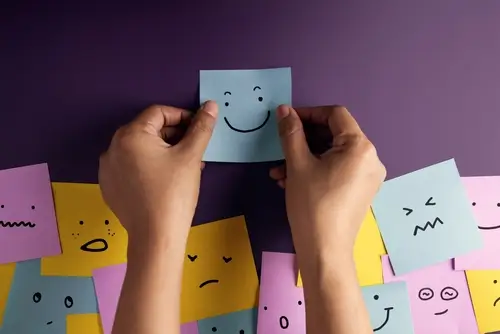Mental health encompasses your physical, emotional, and social well-being and focuses on your mental state. Learning how to set reminders to check in with your mental well-being is an essential skill. Setting these reminders and understanding how to manage your mental health will lead you to a better and more fulfilling life.
In this article, we will cover why mental health reminders are important, practical mental health reminders for you to use in your daily life, how to create healthy routines, and when to seek professional help.

Why Mental Health Reminders Are Important
Mental health reminders serve as gentle pushes toward us staying aware of our thoughts, emotions, and behaviors. By incorporating these reminders into our daily life and routines, we maintain a healthy mindset, create personal growth, and reduce stress and anxiety. The impact of this on our personal life can be immensely positive.
Maintaining a Healthy Mindset
Maintaining a healthy mindset allows us to stay positive, even during bad days. By having a healthy mindset, you are ahead of negative thoughts and emotions that may come your way. Maintaining a healthy mindset also means promoting self-awareness. When we take the time to identify and recognize our thoughts and emotions, we can then see the negative patterns or triggers that may affect our mental health.
Fostering Personal Growth
Personal growth can look different for everyone, but understanding how to foster your personal growth is essential. Utilizing mental health reminders can help us cultivate a positive mindset to focus on our gratitude, compassion, and self-love leading to personal growth.
Reduces Stress and Anxiety
It’s no secret that stress and anxiety are the primary triggers for poor mental health. Recognizing and understanding the stressors in your life can allow you to develop coping skills to reduce their impact on your mental well-being. By having regular mental health reminders, it can also help us manage stress better.
Practical Mental Health Reminders for Daily Life
You may already know why mental health reminders are important but don’t know where to start. It can be overwhelming with all the options and technology out there. Luckily, there are practical mental health reminders that anyone can do if they put their mind to it.

Prioritize Self-Care
Self-care acts as the foundation of mental health. Prioritizing self-care allows you to dedicate time to your emotional and physical health to benefit your mind, body, and soul. Self-care can include:
- Engaging in your hobbies
- Dedicating time to take care of yourself
- Spending time with family members
- Exercising
- Taking time to relax
Set Boundaries with Others
Setting boundaries with others is essential in maintaining your mental well-being. When you can recognize and establish boundaries with the people around you, you can protect your mental state and foster positive relationships. This may be difficult with loved ones, but ensuring proper communication can ease this stress and will benefit your mental health in the long run. For example, if you notice a family member or friend is asking inappropriate questions about your therapy sessions, it’s important to clarify your discomfort and express your feelings in a productive and loving way.
Maintain Social Connections
While setting boundaries with others is a great way to improve your mental health, it’s also important to maintain positive social connections. Isolation can be detrimental to your mental health, so having a support system, you can safely reach out to when struggling can be vital. For instance, make sure to check in with friends or family regularly or set up specific days or times to spend time with them.
Set Realistic Goals
When deciding to improve your mental health, it’s important to understand the limits of your capabilities. Setting realistic goals for yourself will set you up for success instead of failure. By breaking down your goals into smaller, more manageable steps, you can make them more achievable. For example, instead of setting a goal of going to the gym every day for 1 hour, which may be unrealistic at first, try going on a 15-minute walk every other day.
Take a Break
Trying to keep up with everything in life can be exhausting. School, work, family, and improving yourself are all important things to manage daily. In all this chaos, it’s essential to take a break sometimes. Take a walk, do some deep breathing exercises, or take time for yourself. While you do not have a take a large break, setting aside some time to recuperate will improve your mental health.
Stay Well-Rested
Getting enough sleep every night plays a vital role in mental health reminders. Getting enough sleep can help you think clearer, focus better, and improve your reflexes. Sleep can affect your mental and physical health, so ensuring a comfortable sleep environment, a consistent sleep schedule and a bedtime routine can benefit your mental health. For example, you may start your bedtime routine at a certain each night to ensure you are going to sleep at an appropriate time or this may be staying off electronics for 30 minutes before bed to clear your mind.
Limit Negativity Around You
You can significantly improve your mental health by surrounding yourself with positive media, people, and mindsets. While this may seem complicated, it can be as simple as limiting your time on social media. It is also good to cut out toxic relationships to limit the number of negative people in your life.

Tips for Creating Healthy Routines
Healthy routines are the backbone of mental health. Having a good routine makes us less likely to fall back into bad habits. However, starting and sticking with a routine can be challenging. According to a study conducted in 2010, it can take an average of 66 days for a habit to form but may take up to 8 and a half months for some. So, don’t get discouraged from starting a new habit. Stick with it, and don’t give up! In the meantime, here are some tips to help you create a healthy routine.
Start Small
Many people think you must completely change your life to create a healthy routine. While this is not necessarily the case, you can change your life little by little. You can start by changing one thing in your existing routine to something healthier or cutting out a bad habit one at a time instead of all at once.
Add on to Your Existing Habits
Chances are you already have an existing routine that you follow. By adding positive changes to your routine, you are not completely changing your lifestyle but slightly improving it. This also allows you to create your routine at your own pace as you slowly introduce healthy habits.
Make Swaps
Like adding to your existing habits, swapping out unhealthy or nonbeneficial habits for healthy ones can improve your mental health. By figuring out the habits you can swap out, you will eventually craft a healthy routine that benefits your emotional, physical, and mental health.
Reward Yourself
Rewarding yourself is a great way to build healthy reinforcement of good habits. When you set realistic goals and meet them, rewarding yourself can motivate you to continue building on these routines. While these rewards do not have to be extravagant, making time for what you enjoy will improve your mental health.
Create the Routine That is Right for You
The key to creating a healthy routine is creating the right one for you. Since we do not all live the same lives, no two routines will be the same. Finding out what works best for you and your schedule while making positive changes in your life is important. Remember not to get discouraged if you miss a day in your routine or can’t make a healthy habit. Making these changes can be difficult, and forcing yourself to be perfect can have opposite effects.

When to Seek Professional Help
While mental health reminders and healthy routines can improve your mental health, it’s important to know when to seek professional help. Recognizing the need for a mental health professional can look different for everyone, but here are some of the most common signs of a person experiencing mental illness:
- Appetite changes resulting in weight gain or weight loss
- Difficulty focusing
- Loss of interest in previously enjoyable items
- Inability to perform daily responsibilities
- Difficulty sleeping or changes in sleep pattern
Mental Health Treatment in Los Angeles
At Launch Centers in Los Angeles, CA, we are dedicated to providing holistic mental health, addiction, and trauma treatment to young adults. Our comprehensive, trauma-informed, individualized programs allow individuals to lead purposeful lives after treatment. Launch Centers offer life skill and career development and various therapy modalities to ensure that we reach everyone’s personal needs.
If you or a loved one are struggling with mental health conditions or addiction, contact us today to learn more about our programs.





